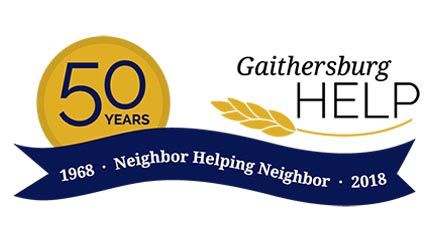Our History
Gaithersburg HELP evolved from a vision that started in 1968. The faith community of Gaithersburg recognized that emergencies can happen on a moment’s notice, yet government assistance often takes time. To meet the immediate needs of families affected by financial challenges, local churches and synagogues joined together to form Gaithersburg HELP in an effort to provide short-term assistance in a coordinated fashion.
Today, our network comprises more than 14 member congregations and over 200 volunteers working together to help those in need within the greater Gaithersburg area. We also receive substantial support from local businesses and civic organizations. A team of committed translators help us serve our diverse community, especially Spanish-speaking clients.
Gaithersburg HELP is governed by the leadership of a Board of Directors. The Board is comprised of an Executive Committee and delegates from each of our member congregations; bi-monthly meetings are open to the public.
For more than 55 years, Gaithersburg HELP has supported local residents in need by providing food, transportation, and other services. Here’s a snapshot of how we made a difference.
Impact
In 2024, Gaithersburg HELP provided assistance for more than 11,600 situations:
- 5,254 food packages, each containing a 3-5 day food supply
- 617 baby formula packages
- 878 rides to medical and social services appointments
- 260 essential prescription medications funded
Awards
During 2024, Gaithersburg HELP received grant awards from the following government agencies and private foundations for our nutrition, transportation and pharmaceutical assistance programs:
| Montgomery County | $127,552 |
| City of Gaithersburg | $43,200 |
| John Edward Fowler Memorial Foundation | $20,000 |
| FEMA Emergency Food and Shelter Program | $17,455 |
| Johns Hopkins Corporate Giving Program |
$15,000 |
| Adventist Healthcare Community Partnership Fund | $12,500 |
| Carl M. Freeman Foundation | $10,000 |
| Maryland Emergency Food Program | $9,602 |
| Pepco | $5,026 |
| Chester County Community Foundation | $5,000 |
| Anonymous |
$5,000 |
| Philip L. Graham Fund | $3,500 |
| Wegmans | $500 |
Publicity
Our Vision
As a vital neighbor-helping-neighbor link in a countywide network of providers, Gaithersburg HELP strives to assist clients with food, transportation, prescription medications, and other basic needs.
Our Mission
Gaithersburg HELP provides individuals and families in the Gaithersburg area with basic needs assistance, to the extent resources are available, and provides them with information and/or a referral to other organizations and agencies. We accomplish this mission through the hard work of our volunteers and the generosity of our donors.
Strategic Plan 2023-2025
Maintain and periodically evaluate the composition of our Board of Directors. Restructure as needed to attain optimal support for our mission through a wider range in experience, such as members with business and fundraising backgrounds.
- Seek delegates with diverse backgrounds to augment the board as at-large members
- Mentor select new volunteers to develop them as possible candidates for leadership positions and to enhance their role versatility
- Strive for role backup training across all key positions
- Engage and inform board members outside of the planned meeting cycle
- Support and show appreciation for our volunteers
Maintain our processes and programs to allow participation of volunteers with varying work schedules. Periodically review and improve our processes and programs so that we can innovate when necessary
- Ensure that all processes and procedures are documented
- Maintain updated position descriptions through yearly review and edit
- Develop and administer annual client surveys to yield outcome information and data that we can apply to enhance our programs and for grant outreach
- Ensure regular reporting and recordkeeping from all leads (rationale: outside funding requires more transparency and reporting back to our funders; pantry operations must be sustainable; Montgomery County, Maryland, requires quantity of reports)
- Ensure the flexibility to adapt to changing client needs and numbers, fluctuations in funding, and the impact of environmental factors on our working environment
- Evaluate the effectiveness of our services and consider adopting or supporting other service delivery models
Maintain our technology base and monitor technological advancements to identify and implement improvements.
- Continue to integrate information technology into all processes and programs
- Continue to collect client email addresses and use them appropriately to disperse information that connects families with assistance in such areas as finance, health, food security, education, and employment.
Engage in outreach efforts that will benefit Gaithersburg HELP in such areas as identifying new funding sources, collaborating in food recovery initiatives, and improving delivery of services to clients.
- Maintain our Grants Program and seek new sources of funds
- Explore opportunities to engage with staff and volunteers from institutions and organizations outside of the food assistance network, such as local government, schools, and faith institutions to ensure that we can understand how our services and mission both support and benefit from these engagements
- Network with leaders of other HELP organizations to strengthen our collective impact on the dialogue surrounding food insecurity and potentially identify new sources of support
- Maintain a strong relationship with Manna, the Gaithersburg CARES Hub, the Capital Area Food Bank, and other key organizations providing the types of services Gaithersburg HELP provides to extend client outreach and obtain more food resources while managing costs
- Leverage our participation in the various collaborative initiatives focusing on all dimensions of food security to ensure that Gaithersburg HELP is included in key decision-making processes and benefits through information transfer
- Increase our participation in Nonprofit Montgomery to enhance our communications and collaboration with other social service organizations in our area
Enhance the cultural awareness of our leadership, volunteers, and program operations.
- Invite speakers to meetings and seek other opportunities to learn about the cultural communities in our service area. Use what we learn to improve our policies, practices, and publications relative to the diverse race, ethnicity, and languages that characterize our community and clientele
- Consider the wishes of our client community when developing our personnel, programs, and procedures including the use of terms that our clients feel comfortable using to describe themselves
- Strive to make the composition of our decision-making bodies and service-delivery volunteers reflect the diversity of the clients we serve
- To the extent practical, support the varied needs and wishes of our clients, including religious dietary requirements, cultural dietary preferences, and health restrictions and needs
- Identify any physical and attitudinal barriers to participation by persons with disabilities to determine how best to ensure full access for our clients when applicable

